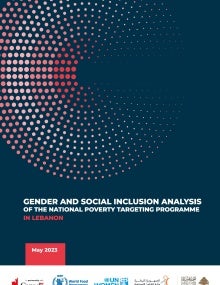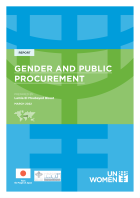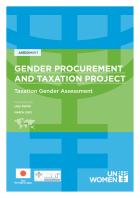1 - 6 of 6 Results
Date:
This gender snapshot is based on the Multi-Sector Needs Assessment 2023, in which findings obtained from data collected with 3,642 households in Lebanon in 2023...
Date:
This study, which examines the conditions of women in Lebanon’s agribusinesses, is the second gender analysis under the Productive Sectors Development Programme (PSDP). UN Women undertook an intersectional gender analysis during PSDP’s baseline phase. The analysis looked at the daily roles and responsibilities of women across fruit and vegetable value chains in the North of Lebanon. It focused on the voices and perspectives of women, recounting the opportunities and challenges in the agriculture sector. It found that women are deeply involved in various agricultural activities but continue to face limited access to resources, such as land and capital; cyclical issues related to personal status laws affecting marriage, family and inheritance; and risks of exploitation due to the high informality of the agriculture sector.
Date:
Governments around the world are the largest buyers. Procurement spending on goods, works, and services generates trillions of dollars in economic activity.
The gender analysis of the Public Procurement law and the policy guidance note are addressed to policy and decision makers in Lebanon, in both the public and private spheres. It is addressed as well to the executive branch of government and particularly the Public Procurement Authority (PPA) whose mission is to oversee and regulate the public procurement system and design and put into effects procurement policies as per the Public Procurement Law no. 244/2021.
Date:
The United Nations sustainable goal 5 relating to gender equality, more specifically targets 5.5, 5A and 5C, establish the urgent need to promote legislation, policies and practices, as a necessary foundation for a peaceful, prosperous and sustainable world. Our main target in this report is to analyze the Lebanese tax system and ensure recommendations are presented to ensure a more gender equitable tax system.
Date:
Few Syrian refugee and Lebanese women participate in the labour force in Lebanon, often due to critical gender barriers: housework and childcare obligations. This is particularly true for low-income women, who participate in economic activities at lower rates than men and are often unable to afford home help. Inadequate or absent childcare services contribute to women’s economic inactivity and serve as barriers that limit women’s mobility.
Date:
Conducted by UNDP, UN Women, UNFPA, and ESCWA, this study on Gender Justice & the Law in the Arab States Region provides a comprehensive assessment of laws and policies affecting gender equality and protection against gender-based violence in Arab countries. The report is composed of 18 country profiles, each of which maps a country’s key legislative developments and gaps regarding gender justice. This introduction provides an overall summary of these country chapters followed by a...






